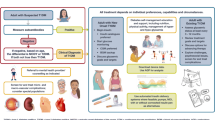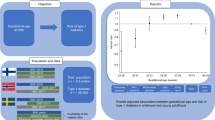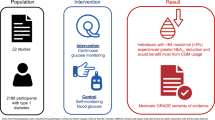Abstract
Aims
GCK-MODY is characterized by mild hyperglycemia. Treatment is not required outside of pregnancy. During pregnancy, insulin treatment is recommended if second trimester fetal ultrasound monitoring shows macrosomia, suggesting the fetus has not inherited the GCK gene. There are limited data about GCK-MODY management in pregnancy. The aim of this study was to examine clinical management and pregnancy outcomes amongst women with a known diagnosis of GCK-MODY.
Methods
In this observational, cross-sectional study, a survey was distributed via Redcap to women ≥ 18 years enrolled in the University of Chicago Monogenic Diabetes Registry (n = 94). All or part of the survey was completed by 54 women (128 pregnancies).
Results
There were 78 term births (61%), 15 pre-term births (12%), and 24 miscarriages (19%). Of the 39 pregnancies where insulin was given, 22 (56%) had occasional or frequent hypoglycemia including 9 with severe hypoglycemia. Average birth weight for full-term GCK-affected infants was significantly less in cases of maternal insulin treatment versus no treatment (2967 and 3725 g, p = 0.005). For GCK-unaffected infants, conclusions are limited by small sample size but large for gestational age (LGA) was common with maternal insulin treatment (56%) and no treatment (33%), p = 0.590.
Conclusions
The observed miscarriage rate was comparable to the background US population rate (15–20%). Patients treated with insulin experienced a 23% incidence of severe hypoglycemia and lower birth weights were observed in the insulin-treated, GCK-affected neonates. These data support published guidelines of no treatment if the fetus is suspected to have inherited GCK-MODY and highlight the importance of additional studies to determine optimal pregnancy management for GCK-MODY, particularly among unaffected fetuses.

Similar content being viewed by others
References
Fajans SS, Bell GI, Polonsky KS (2001) Molecular mechanisms and clinical pathophysiology of maturity-onset diabetes of the young. N Engl J Med 345(13):971–980
Steele AM, Shields BM, Wensley KJ, Colclough K, Ellard S, Hattersley AT (2014) Prevalence of vascular complications among patients with glucokinase mutations and prolonged, mild hyperglycemia. JAMA 311(3):279–286. https://doi.org/10.1001/jama.2013.283980
Stride A, Shields B, Gill-Carey O et al (2014) Cross-sectional and longitudinal studies suggest pharmacological treatment used in patients with glucokinase mutations does not alter glycaemia. Diabetologia 57(1):54–56. https://doi.org/10.1007/s00125-013-3075-x
Chakera AJ, Steele AM, Gloyn AL et al (2015) Recognition and management of individuals with hyperglycemia because of a heterozygous glucokinase mutation. Diabetes Care 38(7):1383–1392. https://doi.org/10.2337/dc14-2769
Spyer G, Hattersley AT, Sykes JE, Sturley RH, MacLeod KM (2001) Influence of maternal and fetal glucokinase mutations in gestational diabetes. Am J Obstet Gynecol 185(1):240–241
Chakera AJ, Carleton VL, Ellard S et al (2012) Antenatal diagnosis of fetal genotype determines if maternal hyperglycemia due to a glucokinase mutation requires treatment. Diabetes Care 35(9):1832–1834. https://doi.org/10.2337/dc12-0151
Spyer G, Macleod KM, Shepherd M, Ellard S, Hattersley AT (2009) Pregnancy outcome in patients with raised blood glucose due to a heterozygous glucokinase gene mutation. Diabet Med 26(1):14–18. https://doi.org/10.1111/j.1464-5491.2008.02622.x
Bacon S, Schmid J, McCarthy A et al (2015) The clinical management of hyperglycemia in pregnancy complicated by maturity-onset diabetes of the young. Am J Obstet Gynecol 213(2):236.e1–236.e7. https://doi.org/10.1016/j.ajog.2015.04.037
Greeley SA, Naylor RN, Cook LS, Tucker SE, Lipton RB, Philipson LH (2011) Creation of the Web-based University of Chicago Monogenic Diabetes Registry: using technology to facilitate longitudinal study of rare subtypes of diabetes. J Diabetes Sci Technol 5(4):879–886
Carmody D, Naylor RN, Bell CD et al (2016) GCK-MODY in the US National Monogenic Diabetes Registry: frequently misdiagnosed and unnecessarily treated. Acta Diabetol 53(5):703–708. https://doi.org/10.1007/s00592-016-0859-8 (Epub 2016 Apr 22)
Paul A, Harris R, Taylor R et al (2009) Research electronic data capture (REDCap)—a metadata-driven methodology and workflow process for providing translational research informatics support. J Biomed Inform 42(2):377–381
Balsells M, García-Patterson A, Solà I, Roqué M, Gich I, Corcoy R (2015) Glibenclamide, metformin, and insulin for the treatment of gestational diabetes: a systematic review and meta-analysis. BMJ 350:h102. https://doi.org/10.1136/bmj.h102 (Review)
Fenton TR, Kim JH (2013) A systematic review and meta-analysis to revise the Fenton growth chart for preterm infants. BMC Pediatr 13:59. https://doi.org/10.1186/1471-2431-13-59 (Review)
National Vital Statistics Reports (2012) vol 60, no 7. https://www.cdc.gov/nchs/data/nvsr/nvsr60/nvsr60_07.pdf. Accessed 17 May 2018
Rossen LM, Ahrens KA, Branum AM (2018) Trends in Risk of Pregnancy Loss Among US Women, 1990–2011. Paediatr Perinat Epidemiol 32(1):19–29. https://doi.org/10.1111/ppe.12417 (Epub 2017 Oct 20)
Hsu LYF (1998) Prenatal diagnosis of chromosomal abnormalities through amniocentesis. In: Milunsky A (ed) Genetic disorders and the fetus, 4th edn. The Johns Hopkins University Press, Baltimore, p 179
Liu J, Wang XF, Wang Y, Wang HW, Liu Y (2014) The incidence rate, high-risk factors, and short- and long-term adverse outcomes of fetal growth restriction: a report from Mainland China. Medicine (Baltimore) 93(27):e210. https://doi.org/10.1097/MD.0000000000000210
Nielsen LR, Pedersen-Bjergaard U, Thorsteinsson B, Johansen M, Damm P, Mathiesen ER (2008) Hypoglycemia in pregnant women with type 1 diabetes: predictors and role of metabolic control. Diabetes Care 31(1):9–14 (Epub 2007 Oct 1)
Sénat MV, Affres H, Letourneau A et al (2018) Effect of glyburide vs subcutaneous insulin on perinatal complications among women with gestational diabetes: a randomized clinical trial. JAMA 319(17):1773–1780. https://doi.org/10.1001/jama.2018.4072
Shields BM, Hicks S, Shepherd MH et al (2010) Maturity-onset diabetes of the young (MODY): how many cases are we missing? Diabetologia 53:2504–2508
Chakera AJ, Spyer G, Vincent N, Ellard S, Hattersley AT, Dunne FP (2014) The 0.1% of the population with glucokinase monogenic diabetes can be recognized by clinical characteristics in pregnancy: the Atlantic Diabetes in Pregnancy cohort. Diabetes Care 37(5):1230–1236. https://doi.org/10.2337/dc13-2248
Rudland VL, Hinchcliffe M, Pinner J et al (2016) Identifying glucokinase monogenic diabetes in a multiethnic gestational diabetes mellitus cohort: new pregnancy screening criteria and utility of HbA1c. Diabetes Care 39(1):50–52. https://doi.org/10.2337/dc15-1001
Funding
L.T.D. developed the study concept and design, acquired data, analyzed and interpreted data, drafted the manuscript, and critically revised the manuscript for important intellectual content. L.R.L. acquired data, critically revised the manuscript for important intellectual content, and provided administrative, technical, or material support. M. S. analyzed and interpreted data, and critically revised the manuscript for important intellectual content. S.A.W.G. developed the study concept and design and critically revised the manuscript for important intellectual content. L.H.P. developed the study concept and design, critically revised the manuscript for important intellectual content, and obtained funding. R.N.N. developed the study concept and design, acquired data, analyzed and interpreted data, drafted the manuscript, critically revised the manuscript for important intellectual content, obtained funding, and supervised the study. L.T.D. is the guarantor of this work and, as such, had full access to all the data in the study and takes responsibility for the integrity of the data and the accuracy of the data analysis. This work has been presented in poster form at the Endocrine Society Meeting (Chicago, IL, 3/19/18) and ADA Scientific Sessions (Orlando, FL, 6/24/18). This work was supported by the National Institute of Diabetes and Digestive and Kidney Diseases of the National Institutes of Health [grant numbers T32 DK007011, R01 DK104942, P30 DK020595, K23 DK114564] and the CTSA [grant number UL1 TR002389]. We thank Kristen Wroblewski, MS for assistance with statistical analysis.
Author information
Authors and Affiliations
Corresponding author
Ethics declarations
Conflict of interest
All authors declare that they have no conflict of interest.
Ethical approval
This study was approved by the University of Chicago Institutional Review Board and was performed in accordance with the ethical standards as laid down in the 1964 Declaration of Helsinki and its later amendments or comparable ethical standards.
Additional information
Managed by Antonio Secchi.
Rights and permissions
About this article
Cite this article
Dickens, L.T., Letourneau, L.R., Sanyoura, M. et al. Management and pregnancy outcomes of women with GCK-MODY enrolled in the US Monogenic Diabetes Registry. Acta Diabetol 56, 405–411 (2019). https://doi.org/10.1007/s00592-018-1267-z
Received:
Accepted:
Published:
Issue Date:
DOI: https://doi.org/10.1007/s00592-018-1267-z




